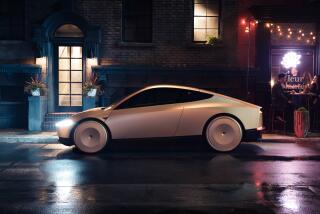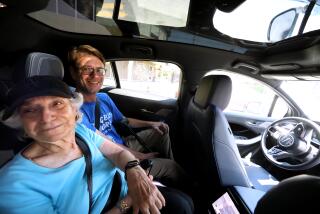‘Alexa. Why can’t you control everything in my car?’
Reporting from San Francisco — If you buy a new Nissan, you can tell Amazon’s Alexa to unlock the car before you leave the house.
That’s nice.
If you buy a new Ford, you sit behind the wheel and tell Alexa to order diapers or ask about the weather.
That’s nice, too.
But those capabilities are trivial compared with the kind of power that a true virtual personal assistant would have to understand your commands and improve the driving experience.
Wouldn’t it be great to get into the car and just tell it what you want, without worrying about apps and devices and what’s incompatible with what? To just say:
Turn on the car.
Slow down the wipers.
What’s the cross street for that Midas place on Sepulveda?
How much washer fluid do I have left?
Play me the Jeff Parker station on Pandora.
Are the streets going to freeze?
Yeah, that would be great. “And it’s coming,” said Evangelos Simoudis, venture capitalist and managing director at Synapse Partners.
But not yet, and not at the 2017 Los Angeles Auto Show, which opens for industry insiders on Monday and for the general public on Friday. Attendees will be greeted by overwhelming displays of the latest in awesome in-car technology this year, but the words “seamless operation” don’t describe any of the systems. “Until this new ecosystem gets sorted out we will have a messy environment,” Simoudis said.
Messy, because the automobile industry is facing revolutionary change and everybody wants a piece of what comes next.
For 100 years, the car has been king of personal transportation. The industrial hierarchy was clear: The automakers said jump. Their suppliers said, how high?
Now motor vehicles are on a transformative path that turns them into not just cars and trucks, but mobile network nodes. Bristling with sensors and touch screens, connected via broadband wireless networks to banks of cloud computers powered by machine intelligence, destined to push human beings out of the driver’s seat and take full operational control, these wheeled transport machines will be ruled by software.
Now car companies, auto suppliers, tech companies, software companies and others are all battling to come out on top — or not get destroyed.
Voice control is just part of this new ecosystem, but it’s one of the most important issues to consumers, both for convenience and for safety.
About 3,500 highway deaths in the U.S. last year were due to driver distraction. Part of that is smartphone use, but in-car infotainment systems are to blame too, according to a study funded by the AAA Foundation. Take your eyes off the road for only two seconds and accident risk skyrockets, the study notes — but researchers found drivers spending 40 seconds or more programming navigation systems or tapping out texts on the car’s touchscreen.
Even hands-free voice conversation increases accident risk, studies have shown, partly because people fiddle with their phones even when Bluetooth’s on. Pure voice control would allow drivers to keep eyes on the road and hands on the wheel.
Voice systems have come a long way from the time when computer chips first started making their way into automobiles. Older readers will remember cheesy robotic voices in the 1980s informing them that “your door is ajar.”
Around the turn of the century, automakers started adding voice recognition systems. They started out crude and didn’t get much better. Most carmakers licensed the technology from a company called Nuance, whose Dragon NaturallySpeaking personal computer programs pioneered and popularized “natural language understanding.”
The program had no fundamental problems. The lack of computer power in the car was a big issue, and remains so.
To work well, natural language understanding systems need vast computer power. The automaker systems “work off a hard drive, not the cloud; they have limited dictionaries, they have limited commands, which is why your experience totally sucks,” said Mike Ramsey, connected-car expert at market research firm Gartner.
With the emergence of the smartphone, drivers and passengers increasingly bypassed the expensive, virtually hard-wired infotainment systems that car makers sold as high-margin options, in favor of a more powerful internet-connected handheld computer.
That caused safety issues and began to open up in-car services where outsiders could compete with the car companies: Google Maps, for instance. “The car companies are not selling navigation systems for nearly as much money as they used to,” Ramsey said.
NowAlexa, Apple’s Siri, Microsoft’s Cortana and Google’s Voice have appeared. Taking advantage of those companies’ massive cloud computing systems, experience at crunching big data, and expertise with artificial intelligence, a new product category has emerged: virtual personal assistants.
Unlike in-car technology, these systems are connected to the cloud. As more cars are equipped for broadband communication (pushed in that direction by Tesla) the technology giants see an entry into the automobile.
Car makers are in a bind. Customers want the technology, but the auto companies so far haven’t been able to provide it. Car makers see commercial uses for data they don’t want to cede to Google and Amazon, and they don’t want to lose control of their brands.
“It’s about mind share,” Ramsey said. “If you’re buying the car and the thing you like about it the most is the Google interface or the Apple interface, it diminishes your ability to differentiate yourself from every other car.”
Automakers already have ceded certain entertainment and information by bringing Apple CarPlay and Android Auto into their cars. Voice control is a more existential threat because the highest and best use would be to allow the driver to control everything in the car through an internet-connected assistant that could also be used to download Starbucks coupons or pay parking tickets online — or an infinity of other choices.
Can the automakers compete, or will they submit to tech company domination of the in-car experience?
It’s a tall order, Simoudis said. Automaker product cycles run seven years. Digital services move at internet speed.
Automakers are trying to become a lot more flexible about technology partnerships, especially in autonomous vehicle technology.
“Because of the huge amount of new technology coming, the R&D costs are going to go up,” Carlos Ghosn, Nissan chairman, recently told Automotive News. “We need to have a much more serious conversation about what work should be done outside the company.”
Garmin, the navigation system company, develops infotainment “head units” for automakers. (That’s the center-dash computer screen with the electronics behind it.) Garmin is about to release a system that uses Alexa to communicate directly with a head unit. “That goes far beyond what’s out there now,” said Garmin product manager Kip Dondlinger.
Gartner’s Ramsey is expecting some even bigger voice recognition announcements over the next six months from the big tech companies. Deals with the tech giants so far have not been exclusive, and they’re not likely to be until the market starts sorting itself out.
“There are a lot of different voice systems giving the client options,” said Denise Barfuss, a senior manager at automaker Nissan.
But at some point, customers will begin to demand a seamless, universal voice experience in the car — and most analysts are giving the edge to the big tech companies.
Twitter: @russ1mitchell







